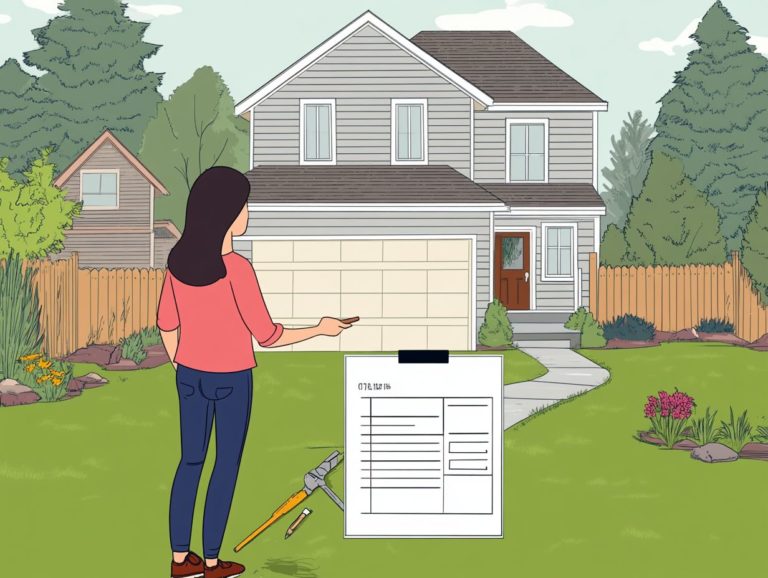How to Read and Interpret Your Home Inspection Report
Purchasing a home is a monumental investment, and understanding its condition is very important.
Home inspections serve a critical function in this journey, uncovering hidden issues that could spare you from expensive repairs in the future.
This article delves into the significance of home inspections and guides you through interpreting your inspection report. It offers invaluable insights, emphasizing key red flags to be vigilant about, empowering you to safeguard your investment.
Contents
- Key Takeaways:
- The Importance of Home Inspections
- Understanding Your Home Inspection Report
- Interpreting the Findings
- Addressing Concerns and Negotiating Repairs
- Tips for Reading and Understanding the Report
- Common Red Flags to Look For
- Frequently Asked Questions
- What is a home inspection report and why is it important to read and interpret it?
- Where can I get a home inspection report?
- What should I look for when reading a home inspection report?
- How can I understand the terminology used in a home inspection report?
- What if I disagree with something in the home inspection report?
- Are there any additional steps I should take after reading and interpreting my home inspection report?
Key Takeaways:

Home inspections are crucial for every homeowner to identify potential issues and maintain the safety and value of their property. Understanding and interpreting the home inspection report is essential in addressing major and minor concerns and negotiating repairs. Pay special attention to key sections and look for common red flags that could indicate potential problems.
The Importance of Home Inspections
Home inspections are essential in the real estate market, acting as a vital step for both home buyers and sellers to ensure a successful property transaction.
When you engage a certified home inspector for a thorough inspection, you receive a detailed assessment of the property’s condition, spotlighting key issues that could influence the sale process.
This visual inspection reveals major concerns, like structural and electrical issues, and minor details that can influence negotiations.
Knowing what your inspection report really means can significantly influence how you make financial decisions and shape your expectations as a buyer. Familiarizing yourself with understanding the home inspection process is key to this.
Why Every Homeowner Should Get One
Every homeowner should seriously consider obtaining a home inspection. It s not just about evaluating the property s current state; it s about safeguarding your financial investment and ensuring a safe living environment.
By investing in a comprehensive inspection, you can uncover critical insights about the condition of essential systems within your home, including electrical, plumbing, and structural integrity.
Often, these findings reveal issues that aren t immediately apparent, allowing you to address potential safety concerns before they escalate into more significant problems.
Understanding the repair costs tied to necessary fixes gives you the power to make informed decisions, enabling effective budgeting and helping you avoid unexpected expenses down the line.
Ultimately, taking a proactive approach to home maintenance enhances your property’s longevity and fosters a sense of security for everyone who resides within it.
Understanding Your Home Inspection Report
Grasping the intricacies of your home inspection report is essential for successfully navigating the home buying journey. To better understand this important document, know what to look for in a home inspection report, as it gives you a clear picture of your property’s condition, pinpointing any issues that require attention.
Within the report, you’ll find a summary page that emphasizes significant defects discovered, alongside minor concerns that might influence your decisions regarding the sale and ongoing maintenance of the home.
What is Included in the Report
An inspection report is your comprehensive guide, featuring a meticulous account of the visual inspection performed by a certified home inspector. It covers essential systems and features of your home, including heating, ventilation, and air conditioning (HVAC), plumbing, and structural components.
This document delves into critical assessments of electrical systems, roofing, and insulation, providing you with a complete overview of your property s condition. Each section brings to light significant concerns that demand immediate attention such as signs of water damage or structural instability and minor issues like worn-out caulking or cosmetic flaws.
Accompanied by photos, the report visually illustrates the identified problems, becoming an invaluable asset for you as a homeowner or prospective buyer when evaluating repair requests. This level of detail not only enhances your understanding of potential repairs but also gives you the power to make informed decisions during negotiations.
Interpreting the Findings

Interpreting the findings of your home inspection report is crucial for grasping the implications of both major and minor issues. Understanding home inspection reports can significantly impact your property investment.
This knowledge helps you significantly influence your concerns as a buyer and guide your repair negotiations effectively.
Identifying Major and Minor Issues
Identifying both major and minor issues in a home inspection report is essential for homeowners and prospective buyers alike.
This understanding equips you with the insights needed to assess potential safety concerns, repair costs, and the overall condition of the property.
Major issues often include structural problems, such as foundation cracks or roof leaks. Ignoring major issues can risk your safety and your investment. Act quickly to address them!
Conversely, minor issues like cosmetic flaws or small plumbing leaks while still important, generally allow for more flexibility in terms of timing and budget for repairs.
However, it s crucial to remember that neglecting even these minor concerns can lead to their escalation over time. This could result in larger and more expensive problems.
Therefore, distinguishing between major and minor issues gives you the power to make informed decisions about necessary maintenance, safety precautions, and your long-term financial strategy.
Addressing Concerns and Negotiating Repairs
Effectively addressing the concerns outlined in a home inspection report can significantly enhance your negotiation leverage as a buyer.
This smart approach can change how you negotiate repairs and opens the door to favorable outcomes, such as securing repair credits or adjustments in the sale price.
How to Handle Issues Found in the Report
Handling the issues that arise from a home inspection report demands a strategic mindset. This involves evaluating repair requests and making informed financial decisions regarding necessary repairs.
Begin by meticulously reviewing each documented issue in the report. Sort them by how urgent and costly they are. It s essential to prioritize repairs that could impact safety or structural integrity.
Consider a home warranty, a service agreement that helps cover the repair costs of major systems and appliances in your home. It can provide peace of mind and financial support for unexpected repairs in the future.
Getting price estimates from qualified repair people will give you valuable insight into potential costs. This will assist you in effective budget planning.
Finally, think about how these repairs might affect the long-term value of your property. Thinking this way will help you make better choices, ensuring that every step you take elevates the overall worth of your home.
Tips for Reading and Understanding the Report
Reading a home inspection report may seem daunting, but don’t worry! With a few tips from understanding the home inspection report, you can master it easily.
Key Sections to Pay Attention to

When reviewing a home inspection report, it’s crucial for you to focus on the key sections that detail major issues, minor issues, and safety evaluations. Understanding how to use home inspection reports in negotiations will guide your future decisions regarding the property.
Understanding the intricate findings in these sections can profoundly influence your negotiation strategy and overall investment decision.
Major issues often signal critical repairs that may need your immediate attention think roofing problems or plumbing failures which could lead to costly consequences if left unattended.
While minor issues may not seem urgent, they still offer valuable insights into the home s maintenance history and can help you budget for future expenses.
Safety evaluations are especially important. They pinpoint potential hazards like faulty wiring or mold that could jeopardize the well-being of the occupants.
By meticulously analyzing these areas, you can approach your property purchase with enhanced confidence and clarity.
Common Red Flags to Look For
When you conduct a home inspection, being mindful of common red flags gives you the power to pinpoint potential issues that could jeopardize both the value and safety of the property.
Look out for concerns like electrical problems, water damage, and mold, as these can significantly impact your investment.
Signs of Potential Problems
Recognizing the signs of potential problems during a home inspection can save you from costly repairs down the line.
It offers valuable insights into safety concerns, the overall strength of the structure, and anticipated repair costs.
For example, small cracks in walls or ceilings could be hints of shifting foundations. Signs of water damage like peeling paint or warped flooring might indicate plumbing issues or leaks.
Outdated electrical systems can be safety hazards and may require pricey upgrades to meet current standards. Carefully assessing these indicators helps you negotiate better terms, ensuring you steer clear of unforeseen expenses in the future.
Addressing these issues proactively not only boosts the property’s value but also creates a safer living environment for everyone involved. Don t wait; addressing these problems now can save you money later!
Frequently Asked Questions
What is a home inspection report and why is it important to read and interpret it?
A home inspection report is a detailed document outlining the condition of a house and its major systems. To fully grasp any potential issues or repairs needed before purchasing a home, it’s essential to know home inspection terminology when reading and interpreting the report.
Where can I get a home inspection report?

Home inspection reports can be obtained from a professional home inspector hired by the buyer or seller of the property. It is important to choose a qualified and experienced inspector to ensure an accurate and thorough report.
What should I look for when reading a home inspection report?
When reading a home inspection report, pay attention to any major issues such as structural problems, electrical or plumbing issues, and safety hazards. Additionally, consider how to leverage the information by following how to use home inspection reports effectively, and take note of any recommended repairs or areas that may need further inspection.
How can I understand the terminology used in a home inspection report?
Home inspection reports may contain technical terms and abbreviations that can be confusing. It is important to ask your inspector for clarification and do some research on your own, including tips for reading between the lines of a home report, to understand the terminology used.
What if I disagree with something in the home inspection report?
If you disagree with something in the home inspection report, it is best to discuss it with your inspector and ask for further explanation. You can also seek a second opinion from another qualified inspector to ensure the accuracy of the report.
Are there any additional steps I should take after reading and interpreting my home inspection report?
Yes, after reading and interpreting your home inspection report, you should discuss any major issues or concerns with your real estate agent and the seller. You may also want to consider getting estimates for any recommended repairs and negotiating with the seller for a lower price or repairs to be made before closing the sale.






